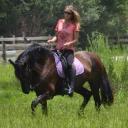Yahoo Answers is shutting down on May 4th, 2021 (Eastern Time) and beginning April 20th, 2021 (Eastern Time) the Yahoo Answers website will be in read-only mode. There will be no changes to other Yahoo properties or services, or your Yahoo account. You can find more information about the Yahoo Answers shutdown and how to download your data on this help page.
Trending News
Why do horses have their hooves trimmed in captivity - but not in the wild?
I saw a programme regarding cruelty to horses where their hooves were overgrown, and it got me thinking what do wild horses do about their feet?
12 Answers
- gallopLv 79 years agoFavorite Answer
Wild horses are well adapted to dealing with the environment. The growth rate of the hooves can slow or accelerate in response to environmental factors. Movement across dry, hard, rocky terrain builds dense and thick protective callus, and the contact with the hard, abrasive terrain wears away excess growth. The rate of growth is accelerated as needed in response to sensory input from superficial nerve receptors when wear is excessive. When the ground is soft and wet and hooves become saturated, the tissues soften and effectively self-trim by chipping off the excessive growth, or sloughing off outer oversaturated layers of tissue, and the rate of growth may be considerably reduced as an adaptive mechanism.
In captivity, most horses can't access varied terrain as they do in the wild, so we have to provide trimming for them. When we can provide them with ideal conditions, their hooves stay healthier and require much less work to maintain. Unfortunately, most domesticated horses don't live in ideal environments, so that maintenance of healthy, hardy, and well balanced hooves can be a real challenge.
Source(s): Registered Nurse and 58 years with horses - loriLv 59 years ago
Captive horses are usually kept in green pastures at best or soil or in a stall. There they travel very little on soft terrain. Wild horses roam many miles a day on rough terrain looking for food and water. Their hooves get trimmed naturally. This also makes hard callouses on the soles and rock crunching hard hooves. No need for shoes. If you had a horse on two thousand acres of rocky terrain you would probably never have to touch its feet.
- zakiitLv 79 years ago
This question has been asked before. I will explain. Wild horses travel wide distances daily to find grazing and water, and they generally walk over rough terrain and therefore their feet are constantly being worn down by the rough stones and rocks and other surfaces they go through.
In captivity horses are kept in very soft conditions - on grassy paddocks, on soft bedding or rubber matting in stables and are ridden on soft surfaces in arenas.
Many need shoes to help with their balance, grip and to hold bad feet together and to cope with the amount of wear and tear on the feet from tarmac roads or gravel which is unnaturally harsh on the feet. So therefore the feet do not wear down naturally and need trimming and filing by a qualified farrier to keep the feet in good order. It is the law that says that all animals, horses and any other is not denied the services of a farrier or vet as and when required. This is why owners are prosecuted for allowing a horse's feet come into to disrepair.
We had a case recently near me where a young horse was visited by a vet in response to an urgent RSPCA call, who when he tried to examine the horse's back leg and foot was kicked - and the whole foot flew off! Understandably that poor horse was shot within seconds to spare it any more suffering. The owner was prosecuted for lack of care (he was supposed to be a horse expert!!) and received a jail term. Nothing like what he deserved!
Source(s): Riding instructor - ?Lv 79 years ago
Horses in the wild roam over thousands of miles of different types of soil, some soft, and some hard and rocky, some even over shell. The rocky and shell like surfaces wear the hooves down as they run across them so they do not need trimming. Horses in captivity need their hooves trimmed because they are on the same type of soil all the time.
- How do you think about the answers? You can sign in to vote the answer.
- Jeff SadlerLv 79 years ago
The single biggest reason is that in the wild they struggle to get food. To do this they roam over large distances. It is the sedentary lifestyle of the domestic horse coupled with an over abundance of food (relative to wild horses) that causes the problems.
Also the distances and terrain the horse chooses to travel over is dependent upon their hooves. If a horse is getting sore feet they will choose a path with less rocks and gravel....I have observed this many times in my horses which are not shod for riding. If their feet are in good shape they have no problem taking the rockiest and often shortest path. In riding horses....WE choose the trail for them so this minor (though just how minor it is would be a good question) method of adjusting the wear is absent.
- 9 years ago
Good question !
It isnt like they can go and get their hooves manicured or something is it ?
I would say that horses hooves in the wild naturally wear down or they rub them against stones or something ( its abit like a cat looks after its claws by scratching trees)
since Ive never seen horses in the wild I dont know . Ask a horse expert
- *****Lv 79 years ago
Horses in the wild roam long distances every day, often over rough terrain. This keeps their hooves worn to a proper length.
- Woah, Is MeLv 49 years ago
Timjm009 -Cats don't scratch to maintain claw length it's to release their scent...
Wild horses travel great distances,that helps maintain a good length.The rough terrain files down their hooves naturally.
Source(s): Horse owner and rider - Anonymous5 years ago
a good, qualified organic trimmer is extensive and basically as good as a farrier, if no longer better, for barefoot horses. in spite of the undeniable fact that, there is an entire pile of idiots accessible calling themselves "organic trimmers" and lopping off hooves left and precise devoid of care or regard to the structures they are coping with. The idiots provide barefoot shoers a foul call, and the idiots are possibly the folk your farrier has seen. I do agree nonetheless, the be conscious "organic" is this type of scam in connection with horses. you like your horse to be organic, advantageous, turn him loose on the prairie or throw a mountain lion in his paddock... it quite is organic, precise!
- ?Lv 69 years ago
Horses in the wild spend their entire day roaming around looking for food and water, while they roam they wear down their hooves.
Horses in captivity get nowhere near the amount of exercise as wild horses, so they grow and need trimmed. (and often need shoes)
Good luck!





